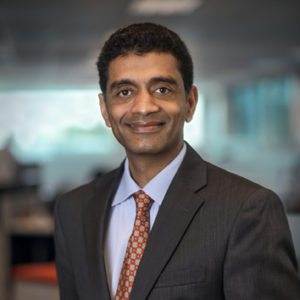As agencies such as the Internal Revenue Service shrink workforces and adopt leaner operational models, resources to support large scale modernization efforts are increasingly constrained. It is under this strain that John Gilroy opens a recent episode of the Federal Tech Podcast recorded live at the AWS Summit in Washington, D.C. Karsun Co-Founder Kartik Mecheri joins John and former General Services Federal Acquisition Services (GSA FAS) Commissioner Alan Thomas for a discussion on AI, digital workforces and the future of government modernization.
As John observes, the landscape of federal technology is at a critical juncture. Imagine systems born in the 1960s, like COBOL, still running essential government operations, while the average federal worker was born almost two decades later! This generational gap, combined with a shrinking government workforce creates an undeniable need for modernization.
At the same time, government agencies face immense pressure to deliver better experiences for their customers while grappling with complex legacy systems and processes that have been perfected over decades. These systems, often mainframes, are not just old; they are mission-critical, meaning they cannot be simply turned off for upgrades. Modernizing them is, as John notes, akin to “doing a little upgrade while you’re flying the plane”.
The AI Imperative: Introducing ReDuX AI-Powered Modernization
Enter Artificial Intelligence, AI. Government agencies are increasingly interested in AI for modernization to pick up the slack from fewer personnel and improve service delivery. Karsun Solutions offers a powerful tool designed specifically for this challenge: ReDuX.
The ReDuX Modernization Platform Addresses Several Key Pain Points:
- Declining Subject Matter Expertise: As veteran employees retire, the deep knowledge of these legacy systems often walks out the door with them. Redux.ai aims to capture this expertise.
- Complex Migrations: Converting decades of intricate code and interactions into modern architectures within a tight timeframe (e.g., 40 years of work into a 5-year project) is a monumental task.
How ReDuX Transforms Modernization
Redux uses specialized AI agents to streamline the modernization process:
- Blueprinting Agents: These agents delve into legacy code, extract crucial information, and integrate it with user guides and demonstrations. The goal is for the agents to become the subject matter expert on the legacy system.
- Modernization Agents: Once the legacy system is understood, these agents can convert the code to run on modern cloud platforms like AWS or Azure. They ensure the new system adheres to the required architecture and security posture of the agency.
Karsun has successfully used ReDuX to migrate multiple mainframe COBOL applications and other legacy systems (like Visual Basic 6, VB6) to modern technologies. This approach can accelerate modernization by 4x and reduce costs by 2x, reducing key modernization tasks by months and even years.
The Rise of the Digital Workforce
A key concept driving this transformation is the “digital workforce”. This involves building digital equivalents or “digital assistants” for every role in the software development cycle. Imagine:
- An architect agent that understands your target architecture and generates diagrams, documentation, and security architecture.
- Agents for creating unit tests, generating code, or ensuring security compliance.
- Agents for business analysts to create user stories.
The idea is to empower agile teams with digital support allowing them to focus on strategic, high-value, creative, and innovative work. While managing human teams is a well-understood skill, managing these “agents” is a new frontier that the future leaders will need to master.
Looking ahead, experts predict that within a year, we will see more demonstrable examples of AI deployment with clear business benefits. Leaders will need to balance AI’s promise with risks. As they conclude their discussion, John, Kartik and Alan discuss strategies for mitigating AI hallucinations, improving accuracy and reducing security risks. They also discuss identifying technology partners with the strategic relationships required to effectively implement technology in the evolving environment.
For federal legacy systems the modernization journey is complex, but with innovations like Karsun Solutions and the ReDuX team, the path to a more efficient, agile, and secure government future is becoming clearer.
Tune in to the podcast to learn more or check out GoReDuX.ai
Kartik Mecheri joins GovLoop’s Featured Contributor program to share his insights on artificial intelligence (AI), machine learning (ML), modern software development, architecting for cloud-native environments, data solutions, and enterprise modernization for the public sector. The co-founder and Chief Architect of Karsun Solutions, Kartik’s achievements include spearheading large-scale digital transformation projects. His expertise ensures that Karsun delivers cutting-edge services to its customers while enhancing their customers’ internal processes. He has earned industry recognition for excellence in technology solutions, keeping Karsun at the forefront of technological advancements and customer satisfaction.
GovLoop’s core mission is to help government employees to do their jobs better. It provides free resources, blogs, online training, in-person training, and online courses on topics relevant to anyone working in public service. This new series is an extension of Kartik’s position as a trusted advisor to senior government executives on the latest technologies.
Throughout his featured contributor series, Kartik will combine Karsun’s experience modernizing complex legacy systems for federal government agencies with emerging technology research from by the Karsun Innovation Center. In addition to its research and development unit, the center also builds resource toolkits to assist Karsun’s modernization teams. As part of his column, Kartik will share Karsun’s experience using these tools to accelerate modernization.
This includes sharing Karsun’s experience implementing its ReDuX AI toolkit. This toolkit uses AI to address the challenges associated with migrating complex legacy systems. Its AI tools analyze legacy systems built on older coding languages, such as COBOL. Next, it produces visualizations and other information on the structure of the legacy system. With this enhanced insight into the complex relationship between system components, teams can effectively plan incremental modernization of the system without disrupting the current mission-critical parts of the application. Next, the toolkit resources use the information from the system analysis to make recommendations, enabling teams to generate code more efficiently and securely than code generated by human teams without access to those resources. More information on ReDuX is available at GoRedux.AI.
In his first post examining AI-assisted modernization, Kartik delves into the challenges and opportunities presented by the use of AI for code generation. Here, he discusses the evolving software development space as teams use AI to analyze codebases, security and regulatory compliance, and increased efficiency for mundane development tasks. For more from Kartik, follow his Featured Contributor series at https://www.govloop.com/author/kmecheri/.
 Karsun Solutions Co-Founder and Chief Architect Kartik Mecheri recently sat in on Red Hat’s application modernization for government agencies IT Roundtable. Over the course of 40 minutes, this expert panel discussed DevOps, cloud migration, and microservices architecture at scale.
Karsun Solutions Co-Founder and Chief Architect Kartik Mecheri recently sat in on Red Hat’s application modernization for government agencies IT Roundtable. Over the course of 40 minutes, this expert panel discussed DevOps, cloud migration, and microservices architecture at scale.
Initially, Mecheri identifies three paths to DevOps success: a bottom-up CI/CD approach, a top-down performance-focused approach, and an approach focused on loosely coupled architecture. Karsun manifests the combination of the bottom up and top-down approaches through the Continuous Governance life cycle.
He also identifies how working within the established process and culture is key to customer success, and urges teams to seek out opportunities to leverage the cloud’s flexibility and agility to beat bureaucracy. Karsun’s Cloud Runways, for instance, uses platforms that are currently available while focusing on opportunities to utilize cloud-native capabilities already in place. By combining GoLean for DevOps governance, Cloud Runways, and microservices architecture Karsun built modernization solutions for their customers with limited impact on service lines.
The roundtable is available on demand through Red Hat and available here.
For 27 years, the Federal 100 Awards have recognized government, industry and academic leaders who have played pivotal roles that affect how the federal government acquires, develops and manages IT. This year it recognized our own co-founder, Kartik K. Mecheri for his success in “Making GSA more agile.” Kartik has spurred agile development at the General Services Administration with an eye to boosting efficiency. He has been instrumental in helping GSA move away from traditional waterfall development to agile and other methods that stress communication, collaboration and use of the cloud. His influence has extended to GSA’s agile delivery team and innovation lab. Essentially, Kartik and his team created a robust repository of proven, free code for federal agencies to reuse.
About Karsun Solutions
Karsun Solutions modernizes enterprise systems enabling agencies to make the next technological advancement their next opportunity to elevate mission capability. IT solutions from Karsun are tailored to meet agencies’ unique needs and optimize operations. These solutions adapt and stay relevant to current trends while using secure, digital architecture built to last. It is a proven modernization partner whose expertise elevates agency capabilities and ensures every next opportunity is within reach.

HERNDON, VA- Managing partners, Sundar Vaidyanathan and Kartik Mecheri, founded Karsun Solutions, LLC in September 2009. Forming the name from the combination of Kartik and Sundar, Karsun was established to fill a need in the marketplace for small business vendors providing information technology and business modernization expertise to federal agencies. Backed by extensive experience in the public sector the firm will be fully operational in 2010.
About Karsun Solutions
Karsun Solutions is a premier IT and consulting services company with a culture of innovation. We offer a portfolio of Enterprise Modernization services to both Federal agencies and commercial clients. Visit our News page for additional Karsun stories and more information.
About Sundar Vaidyanathan
Sundar Vaidyanathan is the Co-founder and CEO of Karsun Solutions. In this role, he is responsible for the overall strategic direction of the company, developing and executing long-term strategies, and driving business results. Sundar epitomizes Karsun’s commitment to modernizing enterprises through technology innovations. Sundar is a proven leader with deep expertise in developing strong customer relationships, a passion for building high-performance teams, and a disciplined focus on delivery excellence. Prior to founding Karsun Solutions, he held leadership roles at Unisys Corporation and KPMG Consulting, driving strategy and implementation of complex multi-million-dollar IT programs.
About Kartik Mecheri
Kartik Mecheri is Co-Founder and Chief Architect of Karsun Solutions LLC. Kartik sets the vision for leveraging technology and innovation for Enterprise Transformation efforts for our clients. He is a leader in designing transformational modernization solutions building on Modern Software Development, Cloud Solutions, Microservices and asset re-use. Kartik has spurred agile development in large agencies with an eye to boosting efficiency. He has been instrumental in helping them move away from traditional waterfall development to agile and other methods that stress communication, collaboration and use of the cloud. Kartik is a trusted advisor to senior government executives on the latest technologies enabling them to take advantage of benefits with emerging technologies. Kartik is also a renowned thought leader in the Federal Information Technology industry and has published studies, journals, and white papers.
